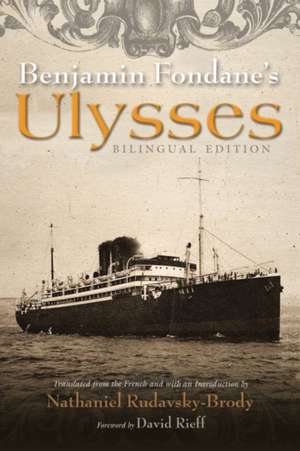Benjamin Fondane's Ulysses: Judaic Traditions in Literature, Music, and Art
Autor Benjamin Fondane Traducere de Nathaniel Rudavsky-Brodyen Limba Engleză Paperback – 29 mai 2017
| Toate formatele și edițiile | Preț | Express |
|---|---|---|
| Paperback (1) | 142.29 lei 3-5 săpt. | |
| Syracuse University Press – 29 mai 2017 | 142.29 lei 3-5 săpt. | |
| Hardback (1) | 429.75 lei 6-8 săpt. | |
| Syracuse University Press – 30 mai 2017 | 429.75 lei 6-8 săpt. |
Din seria Judaic Traditions in Literature, Music, and Art
-
 Preț: 288.38 lei
Preț: 288.38 lei -
 Preț: 173.62 lei
Preț: 173.62 lei -
 Preț: 177.82 lei
Preț: 177.82 lei -
 Preț: 156.94 lei
Preț: 156.94 lei -
 Preț: 78.96 lei
Preț: 78.96 lei -
 Preț: 108.63 lei
Preț: 108.63 lei -
 Preț: 106.18 lei
Preț: 106.18 lei -
 Preț: 111.14 lei
Preț: 111.14 lei -
 Preț: 112.90 lei
Preț: 112.90 lei - 23%
 Preț: 497.10 lei
Preț: 497.10 lei -
 Preț: 259.49 lei
Preț: 259.49 lei -
 Preț: 171.44 lei
Preț: 171.44 lei -
 Preț: 277.16 lei
Preț: 277.16 lei -
 Preț: 120.81 lei
Preț: 120.81 lei -
 Preț: 208.52 lei
Preț: 208.52 lei - 18%
 Preț: 1004.98 lei
Preț: 1004.98 lei -
 Preț: 108.63 lei
Preț: 108.63 lei -
 Preț: 237.37 lei
Preț: 237.37 lei -
 Preț: 235.42 lei
Preț: 235.42 lei -
 Preț: 239.09 lei
Preț: 239.09 lei -
 Preț: 234.50 lei
Preț: 234.50 lei -
 Preț: 245.43 lei
Preț: 245.43 lei -
 Preț: 278.09 lei
Preț: 278.09 lei -
 Preț: 234.65 lei
Preț: 234.65 lei - 23%
 Preț: 477.11 lei
Preț: 477.11 lei
Preț: 142.29 lei
Nou
Puncte Express: 213
Preț estimativ în valută:
27.23€ • 29.57$ • 22.87£
27.23€ • 29.57$ • 22.87£
Carte disponibilă
Livrare economică 01-15 aprilie
Preluare comenzi: 021 569.72.76
Specificații
ISBN-13: 9780815635161
ISBN-10: 0815635168
Pagini: 208
Dimensiuni: 229 x 154 x 16 mm
Greutate: 0.23 kg
Editura: Syracuse University Press
Seria Judaic Traditions in Literature, Music, and Art
ISBN-10: 0815635168
Pagini: 208
Dimensiuni: 229 x 154 x 16 mm
Greutate: 0.23 kg
Editura: Syracuse University Press
Seria Judaic Traditions in Literature, Music, and Art
Notă biografică
Benjamin Fondane (1898-1944) was a Romanian Jew who immigrated to France. He is the author of several collections of poetry and philosophical essays.
Nathaniel Rudavsky-Brody has translated the work of French and Belgian poets, including Paul Valéry and Benjamin Fondane. In 2013, he was awarded the Susan Sontag Prize for Translation.Descriere
"Ulysses, a book-length poem, details Fondane's voyages and various parts of his life, including an Atlantic passage, the experience of living as a cultural and linguistic exile, the precarity of growing up Jewish in early 20th-century Romania, and the desperate streams of emigrants and refugees searching new lives across the ocean" --
